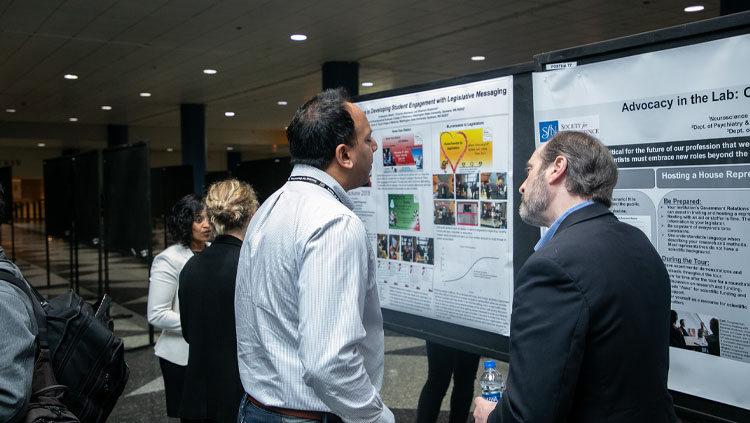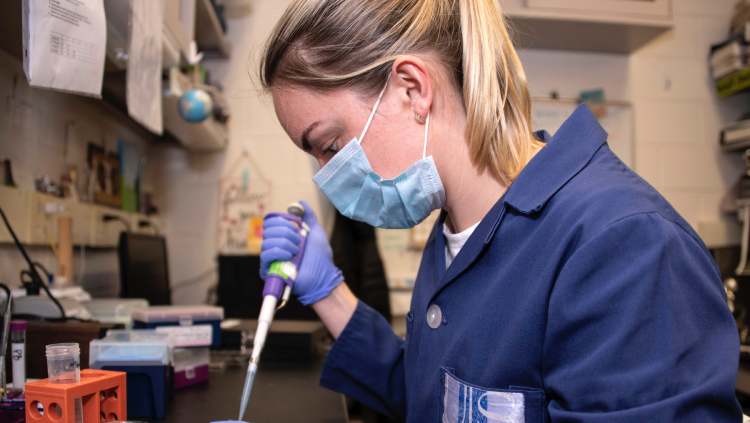
This resource was featured in the NeuroJobs Career Center. Visit today to search the world’s largest source of neuroscience opportunities.
Maybe you’re interested in advocating for science but are waiting to have more time in your career. Or maybe you don’t know where to find groups that can show you how. Either way, this advice from three scientist-advocates from across the career spectrum will help you get started.
Find Opportunities Early
There are a lot of opportunities for trainees to become involved in advocacy work.
There are a lot of opportunities for trainees to become involved in advocacy work. You can do it in addition to your primary research, and it's important that we get our message out. There's a huge communication gap between what we're finding in the lab and how we're communicating both with other scientists and clinicians as well as the public.
Basically any professional organization will have science advocacy, science communication, or science policy. SfN has several events at the annual meeting, and many other professional organizations have similar programs. Learn about science policy and then bring the knowledge back to your own institution.
You can also become involved with professional organizations on campus. At the University of North Carolina at Chapel Hill, there is a Science Policy Advocacy Group, for example. A lot of schools have organizations where trainees and young scientists can meet to come up with ideas for how to contact policymakers. They can also talk about how to share their scientific findings more effectively with the community.
Getting involved early in your career allows you to build collaborations with other like-minded scientists. There's no time like early in your career learn how to more effectively communicate with policymakers and with the public. If advocacy becomes part of your scientific regimen at an early stage, it becomes natural, and it will be easier than if you try to revisit it later in your career.
—Alexander Tuttle, 2019 SfN Early Career Policy Ambassador
Make Time as You Can and Seek Training
One challenge to getting started in advocacy is thinking about how to manage your time. When you're running a lab, time is restricted, and when you're a graduate student, you might even feel like your time isn’t your own, because you're working for someone else.
Convincing your PI it's a good idea to advocate may feel daunting, but there are ways to have that conversation productively. I'm in a fortunate position in that my PI has been extremely supportive. While my advocacy has involved some lab time that could have otherwise been used for experiments, we agreed it was valuable both for my training and the scientific community at large.
One piece of advice is to think about how you can prioritize your interests. If you are inclined to advocate, it’s worth trying to get involved. You can titrate your time commitment by selecting specific activities that fit your schedule.
Think about how you can prioritize your interests. If you are inclined to advocate, it's worth trying to get involved.
Finding someone who knows how to train advocates is also to your advantage, though it’s certainly not required.
SfN does a good job of working with other groups to make sure we are collectively speaking with one voice, which I hadn’t thought about before. After getting involved with SfN and learning a few simple techniques, I’m much more confident going into a room with staffers or Members of Congress and telling them about my research.
—Joe Luchsinger, 2018 SfN Early Career Policy Ambassador
Start by Deciding to Advocate Now
You don’t have to have experience with politicians to become an advocate for scientific research. Just make the decision to do it. Often when we speak with representatives on Capitol Hill, we're talking to people who may not have taken biology, chemistry, or physics classes since high school, and that's okay.
You don't have to have experience with politicians to become an advocate for scientific research. Just make the decision and do it.
In fact, it’s better not to talk to them as scientist peers because you risk getting into the weeds and losing the basic message. To me, that’s one of the most important skills you need to develop as an advocate: the ability to talk to the public about the impact of neuroscience research in an accessible way, and to help them see its broad, societal impact.
We need to convey what the biomedical research enterprise is all about and where it can lead in the future, so that we can ensure continued public support. With all the competing interests in Washington, advocacy is an ongoing effort, and we need more scientists committed to the task.
—Christopher Cowan, chair of the department of neuroscience at
the Medical University of South Carolina
For more advice on getting started in advocacy, read How to Advocate for Science When You Don’t Have Experience, How to Use Your Scientific Training to Change Science Policy, and Three Advocates Share Why They Got Involved and How to Talk to Lawmakers.








